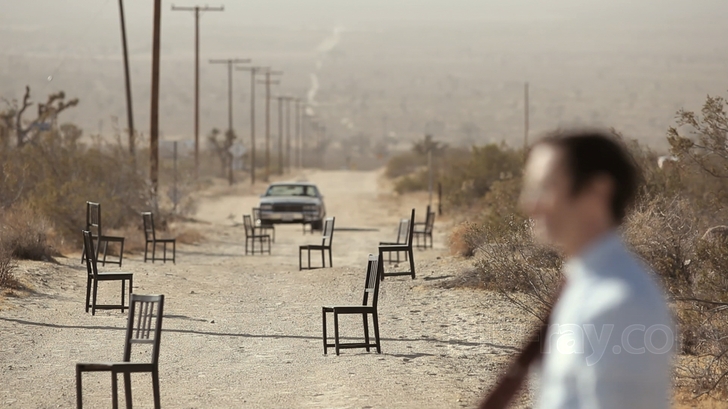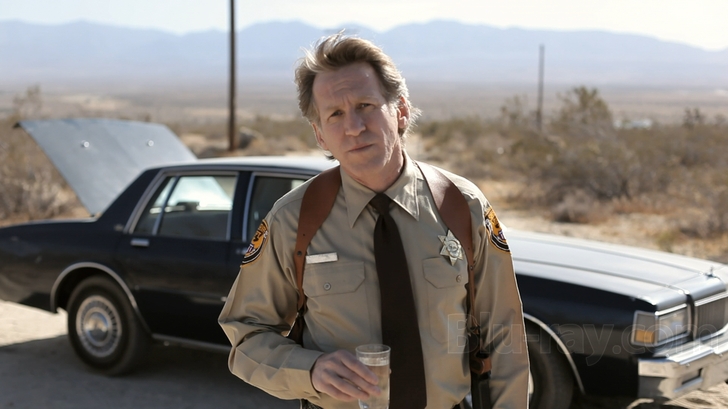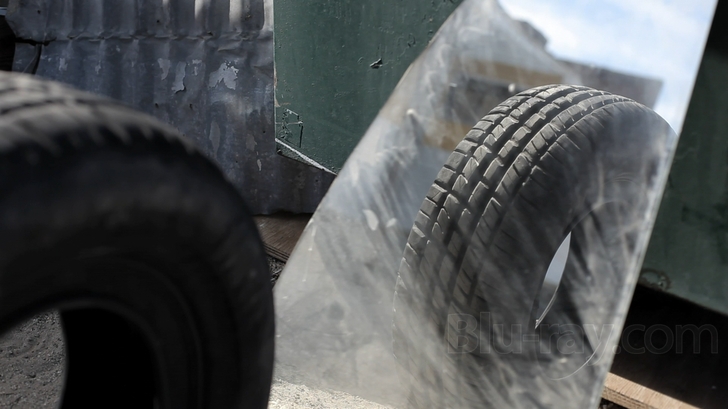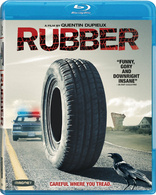Rubber Blu-ray Movie
HomeRubber Blu-ray Movie 
Magnolia Pictures | 2010 | 85 min | Rated R | Jun 07, 2011Movie rating
5.6 | / 10 |
Blu-ray rating
| Users | 3.5 | |
| Reviewer | 2.5 | |
| Overall | 3.2 |
Overview
Rubber (2010)
When Robert, a sentient, animate tire, discovers his destructive telepathic powers, he soon sets his sights on a desert town; in particular, a mysterious woman becomes his obsession.
Starring: Stephen Spinella, Jack Plotnick, Wings Hauser, Roxane Mesquida, Ethan CohnDirector: Quentin Dupieux
| Horror | Uncertain |
| Dark humor | Uncertain |
| Surreal | Uncertain |
| Supernatural | Uncertain |
| Imaginary | Uncertain |
| Comedy | Uncertain |
Specifications
Video
Video codec: MPEG-4 AVC
Video resolution: 1080p
Aspect ratio: 1.78:1
Original aspect ratio: 1.85:1
Audio
English: DTS-HD Master Audio 5.1 (48kHz, 16-bit)
Subtitles
English SDH, Spanish
Discs
25GB Blu-ray Disc
Single disc (1 BD)
BD-Live
Playback
Region A (locked)
Review
Rating summary
| Movie | 2.5 | |
| Video | 4.0 | |
| Audio | 3.5 | |
| Extras | 2.0 | |
| Overall | 2.5 |
Rubber Blu-ray Movie Review
A meta-film experiment with ideas that never gain traction.
Reviewed by Casey Broadwater June 1, 2011There’s nothing new about self-referential cinema. Filmmaking developed alongside modernism in the late 19th and early 20th centuries, and even in the earliest movies we can see cinematic self-consciousness at play. For example, in the 1902 Thomas Edison short “Uncle Josh at the Moving Picture Show,” we watch a country bumpkin react in awe, fear, and anger to a series of films-within-the-film, demonstrating a primitive awareness of—and commentary on—the interaction between cinema, filmmakers, and the audience. You might say that even this awareness has become more self-aware over the last hundred years, in films specifically about the way movies affect their creators and viewers, from Buster Keaton’s Sherlock Jr. and Fellini’s 8 1/2, to irony-laden recent efforts like Spike Jonze’s Adaptation and Wes Craven’s Scream series. In the case of Scream, I think it’s safe to say that by the time a director has become self-referential about his own self-referentiality, it’s time to move on. What’s left to say? This is also the question that confronts French writer/director Quentin Dupieux’s debut film, Rubber, the latest meta-movie to poke fun at genre conventions and audience expectations.

Robert
Rubber breaks the fourth wall in its very first scene to deliver what might best be described as the film’s thesis statement. We watch as a 1980s-model cop car drives up a dirt road in the desert, slaloming back and forth to hit a series of chairs. Why? No particular reason. This is the film’s underlying principle. When the cop car pulls up, Lieutenant Chad (Stephen Spinella) climbs out of the trunk—once again, for no real reason— and addresses us, the audience, directly. “In the Steven Spielberg movie E.T., why is the alien brown? No reason. In Love Story, why do the two characters fall madly in love with each other? No reason.” He continues, “All great films, without exception, contain an important element of ‘no reason.’ Why? Because life itself is full of ‘no reason.’ Ladies and gentlemen, the film you are about to see today is an homage to the ‘no reason,’ that most powerful element of style.”
Dupieux’s first “trick” is when he reveals that the lieutenant is also talking to a fictional audience within the film, a cultural cross-section of average moviegoers who have been gathered in the desert to watch Rubber’s story unfold, from a distance, in real time. A geeky-looking stiff in a shirt and tie, credited as The Accountant (Jack Plotnick), issues them all binoculars. “It’s already boring,” says one bratty kid, but his dad admonishes him, “Don’t be so negative. It’s just the beginning.” These characters will serve as Rubber’s Greek chorus/peanut gallery, commenting on the action and making value judgments about the “film” itself. As you can probably gather, whole sections of the movie seem to exist inside quotation marks.
Get ready for the biggest “no reason” of all. The film these folks are watching is about a car tire named Robert—to get the joke you’ll need to use the name’s French pronunciation—that suddenly becomes sentient and starts rolling around the desert of its own volition. At first, it wobbles and falls over a lot, but it—he, I suppose—soon discovers he has certain capabilities and motivations. When he runs over a discarded water bottle, he seems to relish the crackle of the plastic under his treads, and he ups the ante by slowly crushing a scorpion. Rabbits and crows bite the dust next when Robert learns that he can vibrate with a focused intensity that causes nearby organic matter to violently explode. Even more preposterously, Robert falls in love with a passing female motorist (Roxane Mesquida) and follows her to a motel in the middle of nowhere, where he begins blowing up the heads of anyone who gets in his way, causing chunks of CGI skull and brain matter to fly everywhere. (The gore effects are admittedly well done.) Lieutenant Chad is called in to investigate, but he’s in on the joke that this is “only a movie.” Meanwhile, the accountant throws the now-starving spectators a poisoned turkey, which they proceed to tear into like animals. Remind yourself that “turkey” is often used as slang for a terrible film, and suddenly the metaphor becomes clear. Or, clearer, at least. Dupieux’s intentions are often as irrational and obfuscated as the “no reason” he founds his film upon.
Here’s the crux of the movie: By invoking the “no reason” clause, Dupieux gives himself an anything goes pass to make a film that’s inherently absurd—a Dadaist slasher, if you will. Consequently, no one can call him out for not making sense or “being weird for the sake of being weird.” Doesn’t this seem a little cheap? Unearned? When true cinematic surrealists like Luis Buñuel or David Lynch present seemingly unexplainable images or sequences, there’s almost always an impetus behind them—to express an intuition, or to turn an abstraction into something concrete and visible. On the contrary, there’s no depth to Dupieux’s celebration of the illogical, although he wants us to think that there is. This, of course, is the definition of pretentious. In one sense, the film is too clever—in that its meta-movie affectations distract from its potential entertainment value as a “genre” picture—but it’s also not nearly as clever as it thinks it is. And then there’s the uneasy feeling that Dupieux is being condescending to both his audience and, in a final twist, to the Hollywood brand of filmmaking, painting moviegoers as easily suckered consumers who will literally eat up whatever turkey the studio system throws at them next. This may be at least partially true, but Dupieux’s tone is much too holier-than-thou. Throw in some Michael Haneke-style jabs at the clichés audiences expect from the horror genre, and you have a film that’s didactic and not much fun. Which is sad, because you’d expect a film about a killer tire to be a hell of a good time.
Rubber Blu-ray Movie, Video Quality 

On a more positive note, Rubber is further proof of the democratization of moviemaking—that is, that with just a few thousand bucks worth of gear, a filmmaker can produce an image that's not just adequate, but actually stunning. Dupieux shot Rubber entirely with the Canon 5D Mark II, a prosumer-grade, video-shooting DSLR that, in the last few years, has proven to be a less-expensive alternative to digital rigs like the Red One camera. For its theatrical run, the video was transferred to 35mm, but here we get a straight digital-to-digital 1080p/AVC-encoded transfer that's crisp, clean, and nearly noiseless. There are a few minor source-related shortcomings in the picture, but nothing persistent or overly distracting. The 5D and similar cameras are still susceptible to moiré shimmer on certain fine patterns—the weft of a straw hat, say, or the grill on the front of a police cruiser— and there are some instances of noticeable banding, when the camera's sensor simply couldn't register a smooth enough color gradient. (You'll spot this occasionally in the sky above the desert.) Otherwise, though, this is a very impressive image. Clarity is certainly strong where the image is in focus—shallow depth of field and handheld camerawork often equal a shifting, imprecise focal point—and you'll see a striking amount of detail in desert sand, underbrush, facial textures, and of course, tire treads. Color is rich and lightly stylized, with sufficiently deep blacks and good contrast. Dupieux does have an eye for composition, so it's a shame the film's often arresting cinematography couldn't have been paired with a better story.
Rubber Blu-ray Movie, Audio Quality 

Rubber receives a DTS-HD Master Audio 5.1 surround track here, and the results are clean and precise, if never particularly active. The sound design is often as minimalist as the film's visuals. You'll hear some quiet, windy ambience drifting through the rear speakers, and there are a couple of discrete cross-channel effects—like cars panning from left to right—but most of this track is defined by oddly-phrased dialogue, as well as the low-key score, composed by the director himself, known in French electronica circles as Mr. Oizo, and his collaborator, Gaspard Augé. Voices are always clear and easily discernable, and the music has a strong presence—crank the volume for the full effect. That said, the sound of the tire vibrating also makes frequent appearances, and it gets so loud that you'll probably want to tamp the volume back down again. The disc includes optional English SDH and Spanish subtitles in easy-to-read white lettering.
Rubber Blu-ray Movie, Special Features and Extras 

- Interview with Director Quentin Dupieux (1080i, 8:34): There are two things that stand out about this interview: 1.) The interviewer is a male blow-up doll with a gaping mouth, and 2.) all of Quentin Dupieux's responses are backwards masked and subtitled, like the "Red Room" sequences in Twin Peaks. Other than that, a pretty average Q&A session.
- Interview with Stephen Spinella (1080i, 4:08): The actor who plays Lieutenant Chad describes how his character is a kind of framing device for the sort of movie inside the movie.
- Interview with Jack Plotnick (1080i, 8:08): Plotnick, who plays the accountant, discusses his experience working on the film and his admiration for the director.
- Interview with Roxane Mesquida (1080i, 3:21): Mesquida, whom world cinema fans may recognize from Catherine Breillat's Fat Girl—now out on Criterion Blu-ray—talks about what drew her to the role.
- Rubber Teaser Camera Tests (1080i, 00:49): A few prototype/promo shots of the tire rolling around.
- HDNet: A Look at Rubber (1080i, 4:44): Film critic Robert Wilonski shills the film in this promo for HDnet.
- Theatrical Trailer (1080p, 2:26)
- Also from Magnolia Home Entertainment Blu-ray (1080p, 5:44)
Rubber Blu-ray Movie, Overall Score and Recommendation 

The phrase "your mileage may vary" has never seemed so apt. Rubber is bound to be divisive, lauded by midnight movie fans who will revel in the absurdity of it all, and scorned by those who see how director Quentin Dupieux's admittedly great premise could've been executed much better. Personally, I just couldn't get into it—it feels like Dupieux is talking down to his audience, but at the same time, has very little to actually say. The film makes a strong showing on Blu-ray, with a striking transfer and some fun interviews in the extras department, but I wouldn't advise a blind buy. If you must see it, give Rubber a rental first.
Similar titles
Similar titles you might also like

Tragedy Girls
2017

Bad Milo!
2013

Uncle Sam 4K
1996

Jack Frost
MVD Rewind Collection
1997

The Frighteners
15th Anniversary Edition
1996

Tucker & Dale vs. Evil
2010

Jack Frost 2: Revenge of the Mutant Killer Snowman
MVD Rewind Collection
2000

The Funhouse Massacre
2015

Scream Queens: The Complete First Season
2015

Some Guy Who Kills People
2011

Scary Movie
2000

Ice Cream Man
1995

Sleepaway Camp II: Unhappy Campers 4K
Collector's Edition
1988

Psychos in Love
1987

100 Bloody Acres
2012

The Blackening
2023

Microwave Massacre
1983

Return to Sleepaway Camp
2008

Blood Hook
1986

All Cheerleaders Die
2013
